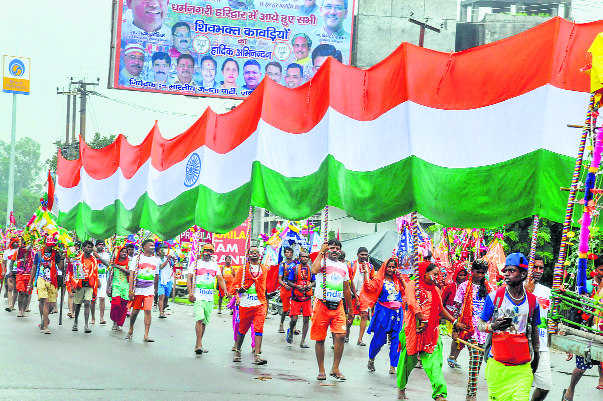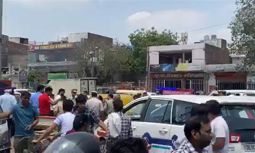
Take note: If the kanwariya on the road is a potential threat to harmony, the one at home with a smartphone is no less dangerous — case in point, the Zomato episode.
Rajesh Ramachandran
The Indian nation is convulsing in the throes of a new dangerous dawn. The old Gandhian republic was long dead and all those who were hiding behind the shroud of this dead yesterday — violating Gandhi — did not foresee what they were ushering in. It is not Savarkar’s Hindutva that has replaced the post-Independence generation’s opportunistic power play, because Savarkar and Jinnah — along with the other proponents of identity politics propped up by the British — had strong theoretical underpinnings. But the new era in politics is dominated by a completely different monster, which the colonial Frankenstein didn’t really design.
For want of a better expression, the creed or the belief system of the practitioners of this new politico-religious exhibition of patriotism can be termed kanwariya nationalism. Kanwariyas, in North India, were pilgrims who set out with water to do jal abhishek at Shiva temples. Probably, they chose the monsoon month of Shrawan as a particularly pleasant time for this pious trek. Interestingly, the ancient concept of carrying a stick with an arched bow is pan-Indian. In South India, carrying the kawadi on the shoulder (without the water) after a strict religious fast is still a pious offering to Subrahmanya, a deity mostly absent in the north Indian pantheon.
But the political mobilisation over religious motifs by the Sangh Parivar has turned the north Indian kanwariya tradition into a militant assertion of Hindu identity on a toxic scale. Uttar Pradesh, now governed by a politician in saffron robes, is the theatre of this dangerous drama. Youngsters in saffron T-shirts and Bermuda shorts on motorcycles and trucks with blaring loudspeakers create a ruckus on the road. Some of them run ahead of the slow-moving trucks to signify the old tradition of pilgrimage by foot. They know no rules, don’t wear helmets and block the traffic as they please. Officers of the IPS are photographed pressing their feet and an IAS officer was seen showering petals on them.
Worse, these hooligans in saffron get the right of way at every traffic junction as if they are supra-citizens. Their eardrum-piercing music, rash driving and hastily built temporary resting places in the middle of the roads are all sanctified by huge national flags. This is a strange combination of saffron militancy and Tricolour legitimacy. There is a small piece of news in Thursday’s newspapers from Kurukshetra about one kanwariya raping another’s daughter in Hardwar, where they go to fetch water. With the supra-citizen status for these young men on bikes and trucks, any small skirmish or scuffle or even an accident could turn into a communal riot. The official sanction to violate traffic rules grants impunity to these youngsters, who are often high on intoxicants, to commit bigger crimes. And every time an IPS officer in uniform presses the feet of one such kanwariya, he is violating the Constitution and establishing the primacy of a certain kind of pilgrim over the idea of citizenship.
The organisers who had conceptualised these political pilgrimages must have wanted Hindutva mobilisation to create a Hindu identity to gain power. But these are youngsters who have been radicalised against the minorities and they believe they have the protection of the State, which is a dangerous political profile: majoritarian prejudice coupled with patriotic pride and a sense of entitlement. If they go berserk, even their progenitors will not be able to control them. Just as they have been organised over the last two decades to travel in visible groups to evoke a group identity, what if they turn against individuals, groups or even the State? If the political objective of this religious mobilisation is over, the organisers need to rethink the need to carry on with a dangerous enterprise.
If the kanwariya on the road is a traffic menace and a potential threat to social harmony, a kanwariya sitting at home with a smartphone is no less dangerous. Giving the same Shrawan excuse, a customer in Jabalpur refused to accept food from a Muslim delivery person employed by the food delivery app, Zomato. This communal act crosses all lines of decency and polite social behaviour. If religion be the logic, the kanwariyas ought to stop driving motorbikes and trucks, which create such traffic nuisance, because most of our crude oil on which their vehicles run comes from Muslim countries.
The Twitter world erupted mostly in defence of Zomato, but also against the app, referring to an earlier instance of a softer treatment of a Muslim customer who cancelled his order because the food was not halal. Well, in the new kanwariya nation the Hindu halal food would be cooked and served/delivered only by a person with a Hindu name. Since these kanwariyas cannot theorise exactly what they want to say, they might as well put out a notice saying that only Hindus are halal. Yes, that is the ridiculous extent to which the fringe is gaining critical mass. Political changes do not begin at the centre, they always creep in from the fringes, the margins. The Ram temple movement towards the demolition of the Babri Masjid began on the fringes and has now completely occupied the political core of the Indian State.
Now, the kanwariyas with smartphones are going to overrun our institutions and our public consciousness. They are the Bhasmasuras of Hindu mythology, who would want to prove their power by blowing up their creators. The first casualty obviously is the rule of law and all those who stop at traffic signals. The next step is too dangerous to even imagine: a communal conflagration across the country that could singe everything in sight. The idea of the supra-citizen, clad in saffron with the Tricolour in hand, only delegitimises the Indian State and all its institutions — within and outside our country’s borders.



























